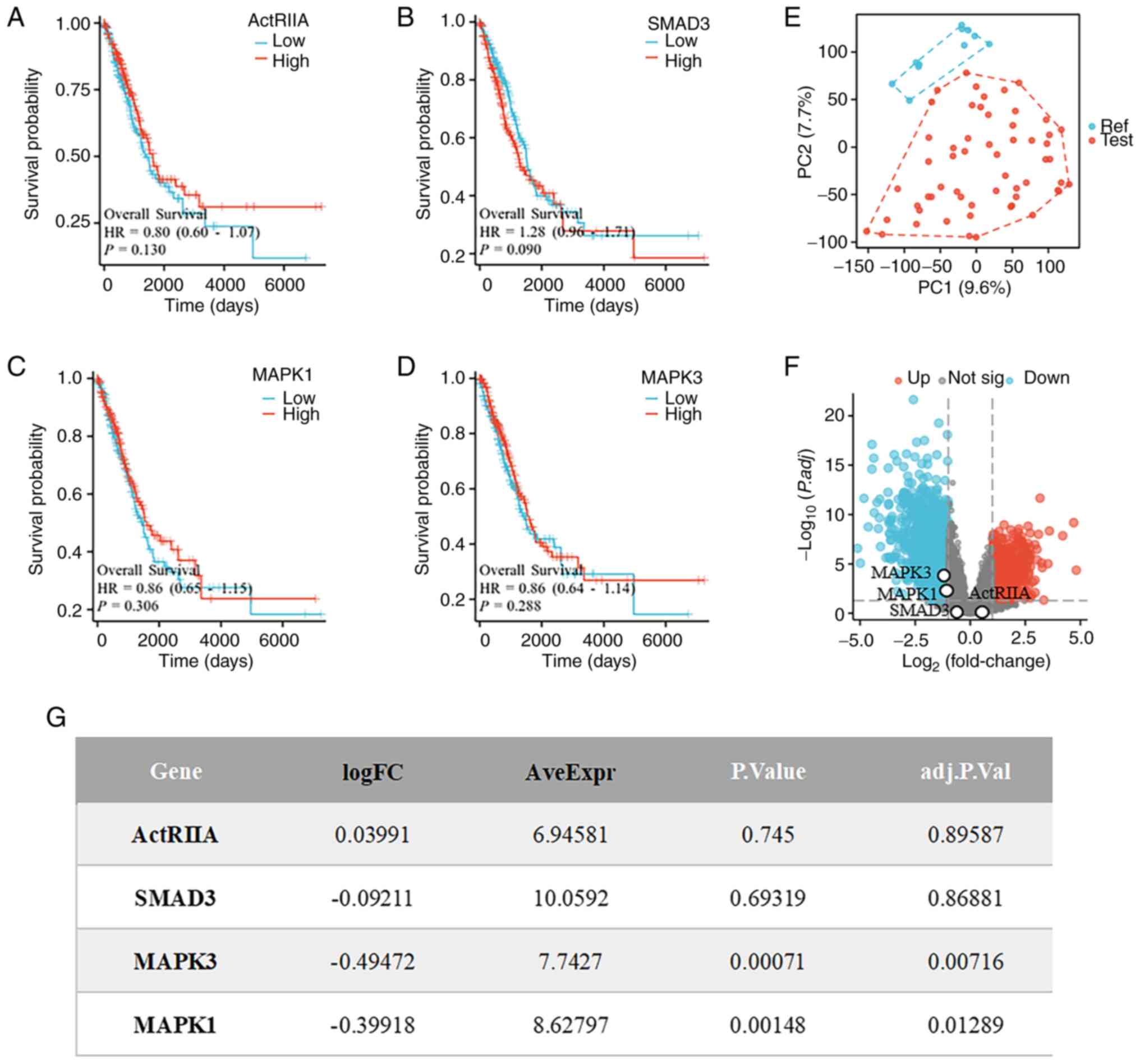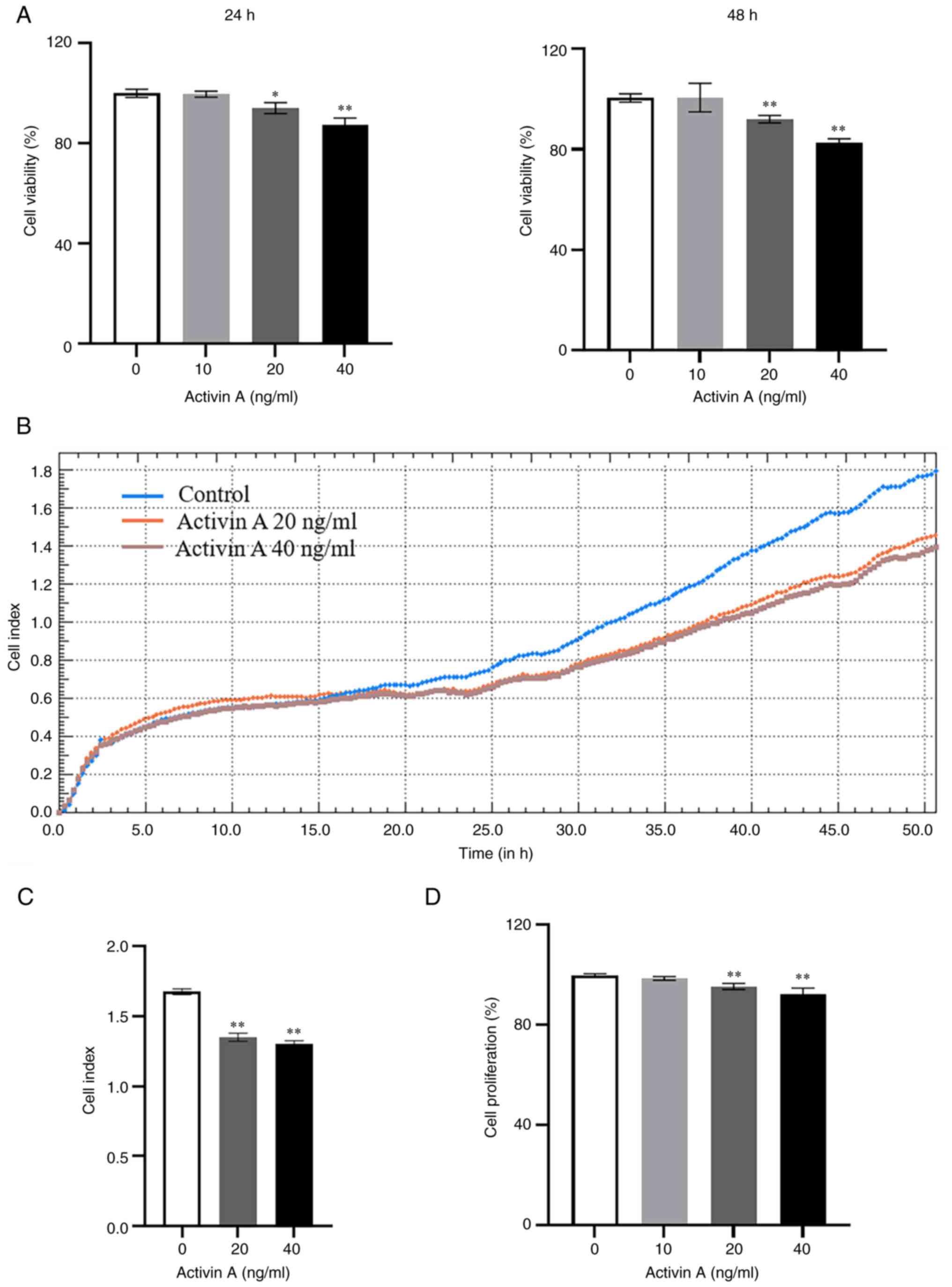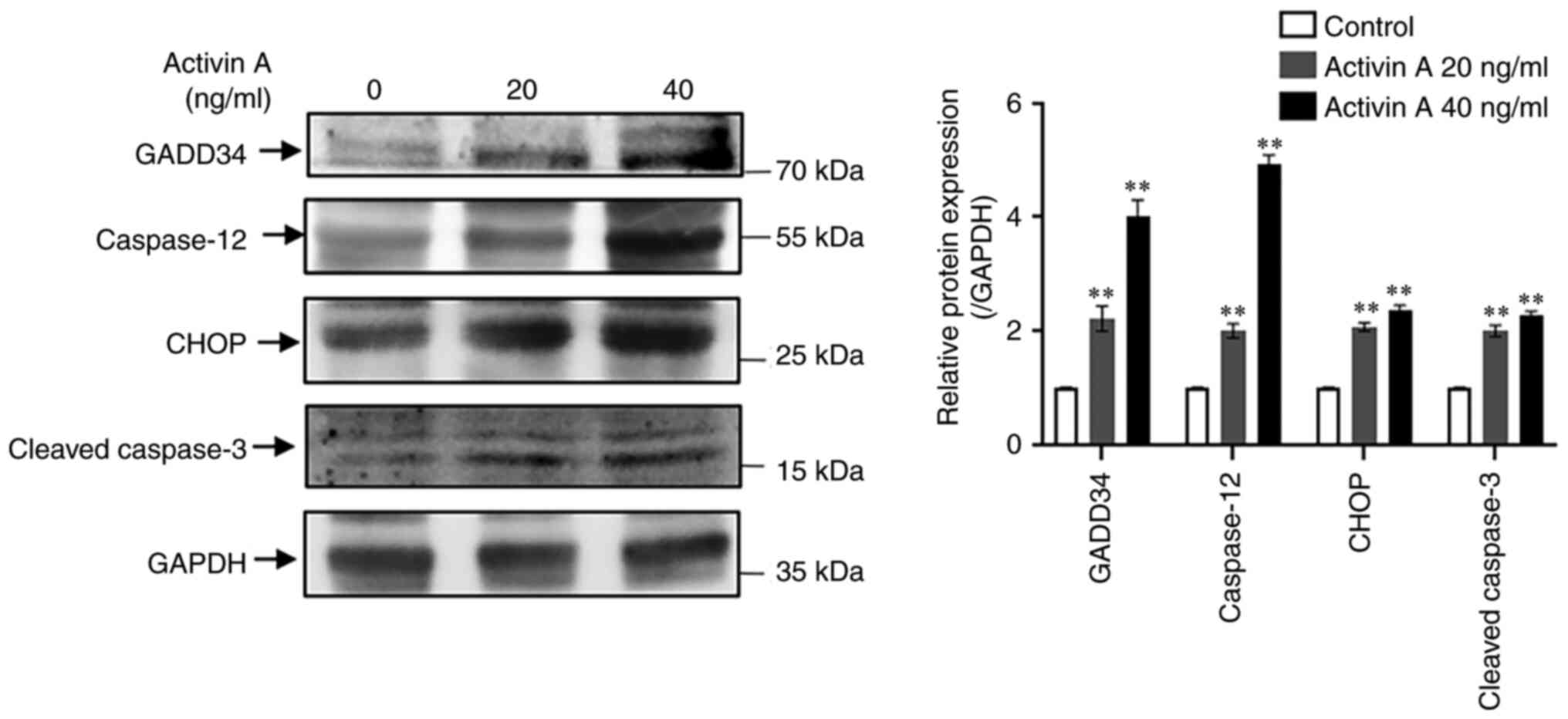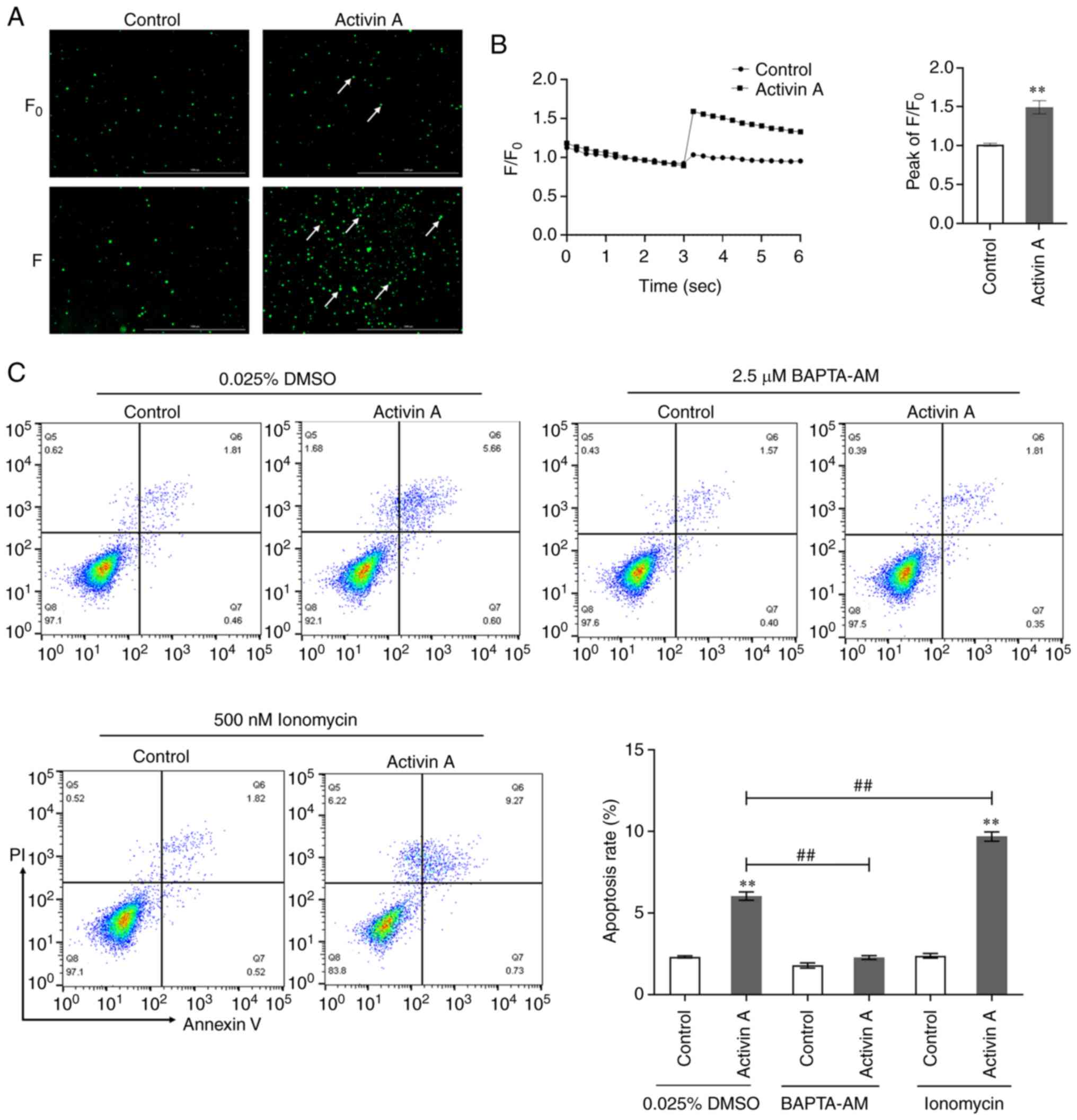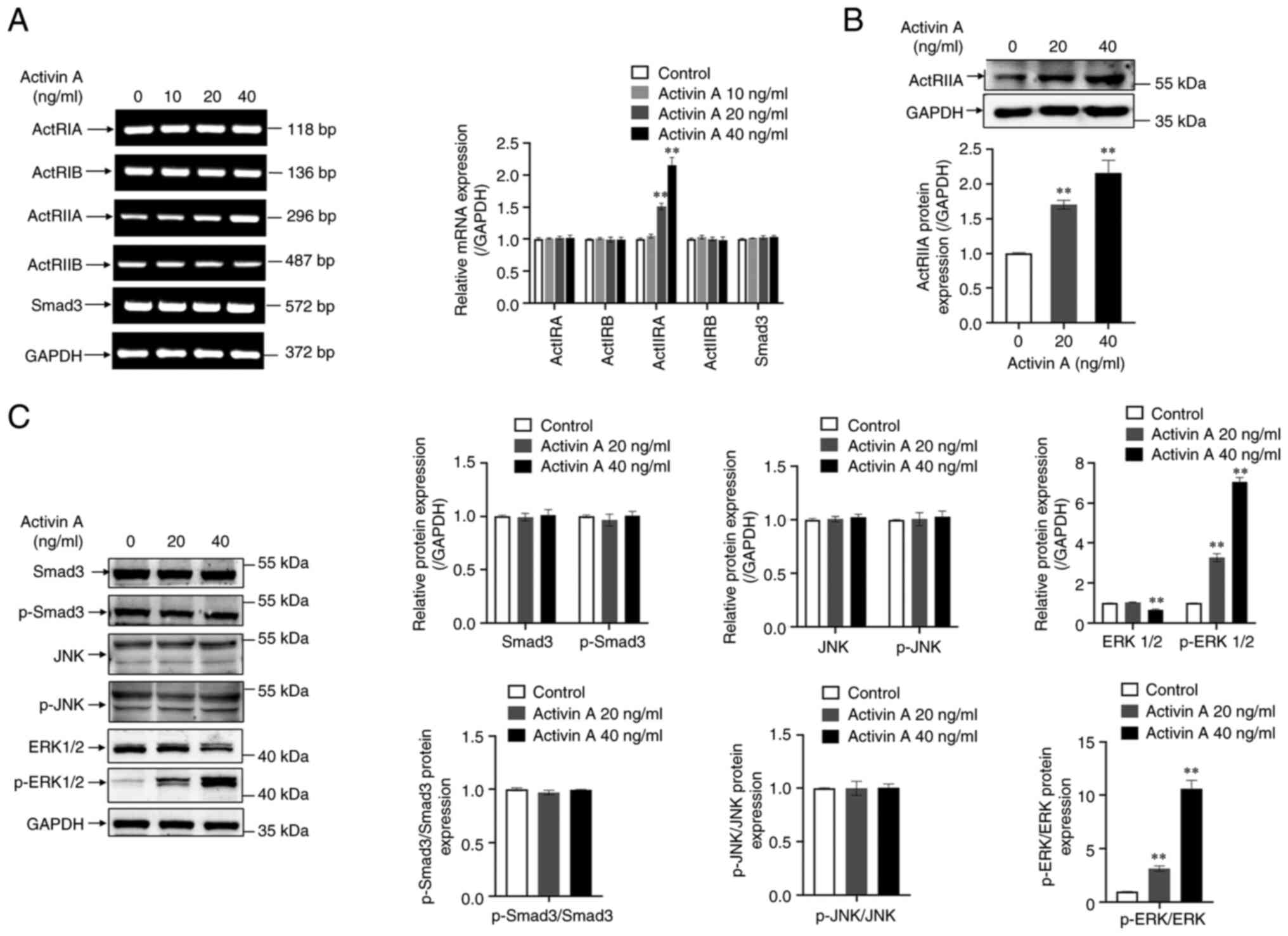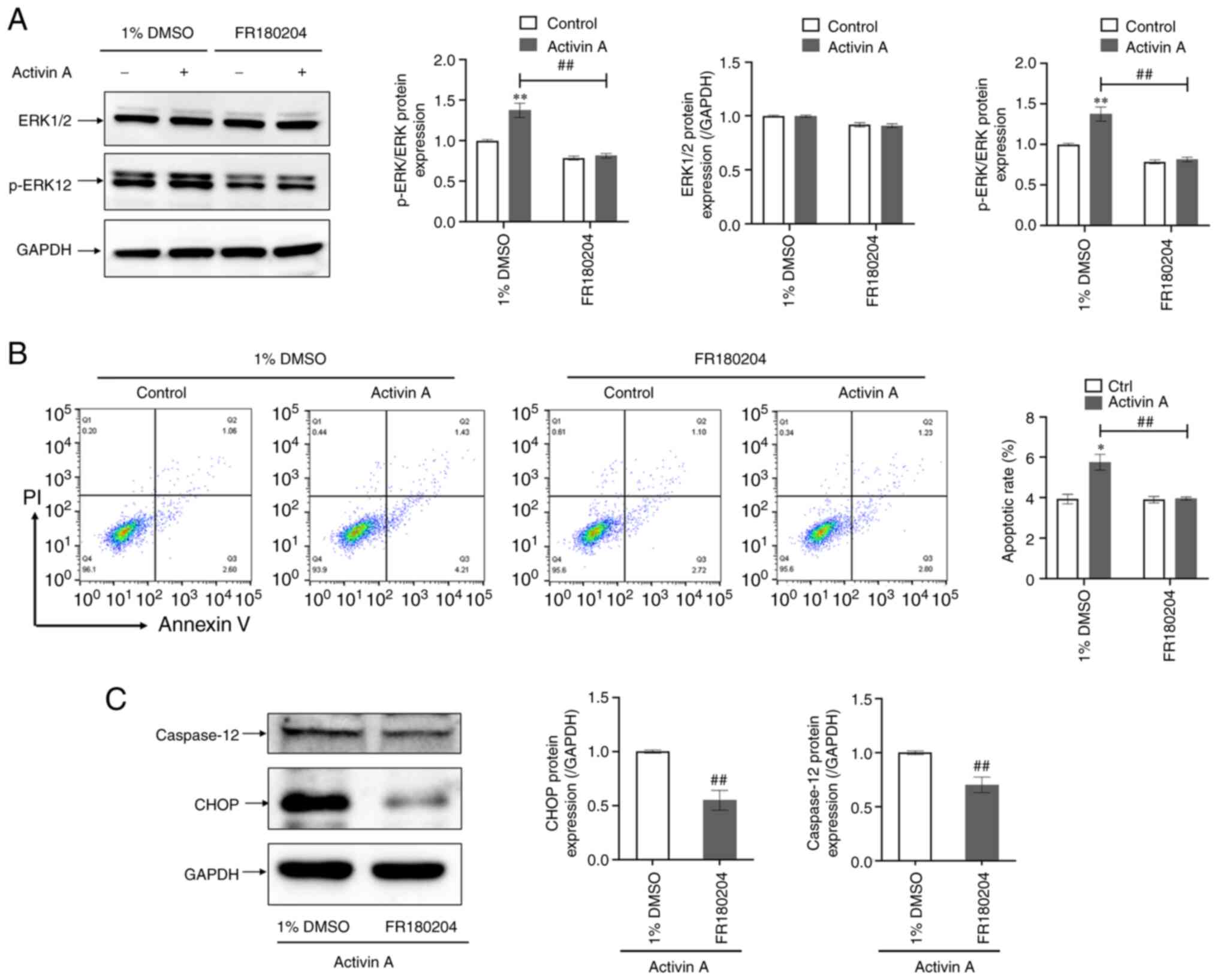|
1
|
Siegel RL, Miller KD, Wagle NS and Jemal
A: Cancer statistics, 2023. CA Cancer J Clin. 73:17–48. 2023.
View Article : Google Scholar : PubMed/NCBI
|
|
2
|
Herbst RS, Morgensztern D and Boshoff C:
The biology and management of non-small cell lung cancer. Nature.
553:446–454. 2018. View Article : Google Scholar : PubMed/NCBI
|
|
3
|
Yu Z, Tang H, Chen S, Xie Y, Shi L, Xia S,
Jiang M, Li J and Chen D: Exosomal LOC85009 inhibits docetaxel
resistance in lung adenocarcinoma through regulating ATG5-induced
autophagy. Drug Resist Updat. 67:1009152023. View Article : Google Scholar : PubMed/NCBI
|
|
4
|
Miller KD, Nogueira L, Devasia T, Mariotto
AB, Yabroff KR, Jemal A, Kramer J and Siegel RL: Cancer treatment
and survivorship statistics, 2022. CA Cancer J Clin. 72:409–436.
2022. View Article : Google Scholar : PubMed/NCBI
|
|
5
|
Zhao C, Zhai Y, Geng R, Wu K, Song W, Ai N
and Ge W: Genetic analysis of activin/inhibin beta subunits in
zebrafish development and reproduction. PLoS Genet.
18:e10105232022. View Article : Google Scholar : PubMed/NCBI
|
|
6
|
Ge J, Sun H, Li J, Shan Y, Zhao Y, Liao F,
Yang Y, Cui X and Liu Z: Involvement of CHOP in activin A-induced
myeloma NS-1 cell apoptosis. Oncol Rep. 42:2644–2654.
2019.PubMed/NCBI
|
|
7
|
Seder CW, Hartojo W, Lin L, Silvers AL,
Wang Z, Thomas DG, Giordano TJ, Chen G, Chang AC, Orringer MB and
Beer DG: Upregulated INHBA expression may promote cell
proliferation and is associated with poor survival in lung
adenocarcinoma. Neoplasia. 11:388–396. 2009. View Article : Google Scholar : PubMed/NCBI
|
|
8
|
Yu SY, Luan Y, Tang S, Abazarikia A, Dong
R, Caffrey TC, Hollingsworth MA, Oupicky D and Kim SY: Uncovering
tumor-promoting roles of activin a in pancreatic ductal
adenocarcinoma. Adv Sci (Weinh). 10:e22070102023. View Article : Google Scholar : PubMed/NCBI
|
|
9
|
Kalli M, Mpekris F, Wong CK, Panagi M,
Ozturk S, Thiagalingam S, Stylianopoulos T and Papageorgis P:
Activin a signaling regulates IL13Rα2 expression to promote breast
cancer metastasis. Front Oncol. 9:322019. View Article : Google Scholar : PubMed/NCBI
|
|
10
|
Ervolino De Oliveira C, Dourado MR,
Sawazaki-Calone Í, Costa De Medeiros M, Rossa Júnior C, De Karla
Cervigne N, Esquiche León J, Lambert D, Salo T, Graner E and
Coletta RD: Activin A triggers angiogenesis via regulation of VEGFA
and its overexpression is associated with poor prognosis of oral
squamous cell carcinoma. Int J Oncol. 57:364–376. 2020. View Article : Google Scholar : PubMed/NCBI
|
|
11
|
Oakes SA and Papa FR: The role of
endoplasmic reticulum stress in human pathology. Annu Rev Pathol.
10:173–194. 2015. View Article : Google Scholar : PubMed/NCBI
|
|
12
|
Di Conza G and Ho PC: ER stress responses:
An emerging modulator for innate immunity. Cells. 9:6952020.
View Article : Google Scholar : PubMed/NCBI
|
|
13
|
Fu X, Cui J, Meng X, Jiang P, Zheng Q,
Zhao W and Chen X: Endoplasmic reticulum stress, cell death and
tumor: Association between endoplasmic reticulum stress and the
apoptosis pathway in tumors (Review). Oncol Rep. 45:801–808. 2021.
View Article : Google Scholar : PubMed/NCBI
|
|
14
|
Xue LX, Liu HY, Cui Y, Dong Y, Wang JQ, Ji
QY, He JT, Yao M, Wang YY, Shao YK, et al: Neuroprotective effects
of Activin A on endoplasmic reticulum stress-mediated apoptotic and
autophagic PC12 cell death. Neural Regen Res. 12:779–786. 2017.
View Article : Google Scholar : PubMed/NCBI
|
|
15
|
Jiang L, Qi Y, Kong X, Wang R, Qi J, Lin
F, Cui X and Liu Z: Activin A as a novel chemokine induces
migration of L929 fibroblasts by ERK signaling in microfluidic
devices. Front Cell Dev Biol. 9:6603162021. View Article : Google Scholar : PubMed/NCBI
|
|
16
|
Jiang L, Liu B, Qi Y, Zhu L, Cui X and Liu
Z: Antagonistic effects of activin A and TNF-alpha on the
activation of L929 fibroblast cells via Smad3-independent
signaling. Sci Rep. 10:206232020. View Article : Google Scholar : PubMed/NCBI
|
|
17
|
Li J, Qi Y, Yang K, Zhu L, Cui X and Liu
Z: Follistatin is a novel chemoattractant for migration and
invasion of placental trophoblasts of mice. Cells. 11:38162022.
View Article : Google Scholar : PubMed/NCBI
|
|
18
|
Norgard RJ, Pitarresi JR, Maddipati R,
Aiello-Couzo NM, Balli D, Li J, Yamazoe T, Wengyn MD, Millstein ID,
Folkert IW, et al: Calcium signaling induces a partial EMT. EMBO
Rep. 22:e518722021. View Article : Google Scholar : PubMed/NCBI
|
|
19
|
Patergnani S, Danese A, Bouhamida E,
Aguiari G, Previati M, Pinton P and Giorgi C: Various aspects of
calcium signaling in the regulation of apoptosis, autophagy, cell
proliferation, and cancer. Int J Mol Sci. 21:83232020. View Article : Google Scholar : PubMed/NCBI
|
|
20
|
Moon DO: Calcium's role in orchestrating
cancer apoptosis: Mitochondrial-centric perspective. Int J Mol Sci.
24:89822023. View Article : Google Scholar : PubMed/NCBI
|
|
21
|
Valero-Aracama MJ, Zheng F and Alzheimer
C: Dorsal-Ventral gradient of activin regulates strength of
GABAergic inhibition along longitudinal axis of mouse hippocampus
in an Activity-Dependent fashion. Int J Mol Sci. 24:131452023.
View Article : Google Scholar : PubMed/NCBI
|
|
22
|
Bloise E, Ciarmela P, Dela Cruz C, Luisi
S, Petraglia F and Reis FM: Activin a in mammalian physiology.
Physiol Rev. 99:739–780. 2019. View Article : Google Scholar : PubMed/NCBI
|
|
23
|
Hashimoto O, Funaba M, Sekiyama K, Doi S,
Shindo D, Satoh R, Itoi H, Oiwa H, Morita M, Suzuki C, et al:
Activin e controls energy homeostasis in both brown and white
adipose tissues as a hepatokine. Cell Rep. 25:1193–1203. 2018.
View Article : Google Scholar : PubMed/NCBI
|
|
24
|
Liu G, Qi Y, Wu J, Lin F, Liu Z and Cui X:
Follistatin is a crucial chemoattractant for mouse decidualized
endometrial stromal cell migration by JNK signalling. J Cell Mol
Med. 27:127–140. 2023. View Article : Google Scholar : PubMed/NCBI
|
|
25
|
Locci M, Wu JE, Arumemi F, Mikulski Z,
Dahlberg C, Miller AT and Crotty S: Activin A programs the
differentiation of human TFH cells. Nat Immunol. 17:976–984. 2016.
View Article : Google Scholar : PubMed/NCBI
|
|
26
|
Ge J, Fan Y, Lu Y, Qi Y, Wang M and Liu Z:
Activin A increases arterial pressure in the hypothalamic
paraventricular nucleus in rats by angiotension II. Neuroreport.
27:683–688. 2016. View Article : Google Scholar : PubMed/NCBI
|
|
27
|
Dzierlega K, Chakraborty M, Lee M, Soliman
AM, Parker D, Khan S, Chan YT, Akbari M, Yokota T, Winer S, et al:
Activin A-Expressing polymorphonuclear Myeloid-Derived suppressor
cells infiltrate skeletal and cardiac muscle and promote cancer
cachexia. J Immunol. 211:497–507. 2023. View Article : Google Scholar : PubMed/NCBI
|
|
28
|
Staudacher JJ, Arnold A, Kühl AA, Pötzsch
M, Daum S, Winterfeld M, Berg E, Hummel M, Rau B, Stein U and
Treese C: Prognostic impact of activin subunit inhibin beta A in
gastric and esophageal adenocarcinomas. BMC Cancer. 22:9532022.
View Article : Google Scholar : PubMed/NCBI
|
|
29
|
Hamang M, Yaden B and Dai G:
Gastrointestinal pharmacology activins in liver health and disease.
Biochem Pharmacol. 214:1156682023. View Article : Google Scholar : PubMed/NCBI
|
|
30
|
Meier D, Lodberg A, Gvozdenovic A,
Pellegrini G, Neklyudova O, Born W, Fuchs B, Eijken M and M Botter
S: Inhibition of the activin receptor signaling pathway: A novel
intervention against osteosarcoma. Cancer Med. 10:286–296. 2021.
View Article : Google Scholar : PubMed/NCBI
|
|
31
|
Tao JJ, Cangemi NA, Makker V, Cadoo KA,
Liu JF, Rasco DW, Navarro WH, Haqq CM and Hyman DM: First-in-human
phase I study of the activin A inhibitor, STM 434, in patients with
granulosa cell ovarian cancer and other advanced solid tumors. Clin
Cancer Res. 25:5458–5465. 2019. View Article : Google Scholar : PubMed/NCBI
|
|
32
|
Cheng X and Ferrell JE Jr: Apoptosis
propagates through the cytoplasm as trigger waves. Science.
361:607–612. 2018. View Article : Google Scholar : PubMed/NCBI
|
|
33
|
Zhang P, Ruan Y, Xiao J, Chen F and Zhang
X: Association of serum follistatin levels with histological types
and progression of tumor in human lung cancer. Cancer Cell Int.
18:1622018. View Article : Google Scholar : PubMed/NCBI
|
|
34
|
Chen F, Ren P, Feng Y, Liu H, Sun Y, Liu
Z, Ge J and Cui X: Follistatin is a novel biomarker for lung
adenocarcinoma in humans. PLoS One. 9:e1113982014. View Article : Google Scholar : PubMed/NCBI
|
|
35
|
Pistritto G, Trisciuoglio D, Ceci C,
Garufi A and D'Orazi G: Apoptosis as anticancer mechanism: Function
and dysfunction of its modulators and targeted therapeutic
strategies. Aging (Albany NY). 8:603–619. 2016. View Article : Google Scholar : PubMed/NCBI
|
|
36
|
Liu S, Luo L, Zuo F, Geng Y, Ou Y, Chen D,
Yang S, Luo W, Wang Y, Wang J and Huang X: Immunosuppression and
apoptosis activation mediated by p53-Bcl2/Bax signaling pathway-The
potential mechanism of goldfish (Carassius auratus Linnaeus) gill
disease caused by Myxobolus ampullicapsulatus. Front Immunol.
13:9989752022. View Article : Google Scholar : PubMed/NCBI
|
|
37
|
Geng Y, Liu P, Xie Y, Liu Y, Zhang X, Hou
X and Zhang L: Xanthatin suppresses pancreatic cancer cell growth
via the ROS/RBL1 signaling pathway: In vitro and in vivo insights.
Phytomedicine. 119:1550042023. View Article : Google Scholar : PubMed/NCBI
|
|
38
|
Marini KD, Croucher DR, McCloy RA,
Vaghjiani V, Gonzalez-Rajal A, Hastings JF, Chin V, Szczepny A,
Kostyrko K, Marquez C, et al: Inhibition of activin signaling in
lung adenocarcinoma increases the therapeutic index of platinum
chemotherapy. Sci Transl Med. 10:eaat35042018. View Article : Google Scholar : PubMed/NCBI
|
|
39
|
Yuan C, Ni L and Wu X: Activin A
activation drives renal fibrosis through the STAT3 signaling
pathway. Int J Biochem Cell Biol. 134:1059502021. View Article : Google Scholar : PubMed/NCBI
|
|
40
|
Hotchkiss RS, Strasser A, McDunn JE and
Swanson PE: Cell death. N Engl J Med. 361:1570–1583. 2009.
View Article : Google Scholar : PubMed/NCBI
|
|
41
|
Kim C and Kim B: Anti-Cancer natural
products and their bioactive compounds inducing ER Stress-Mediated
apoptosis: A review. Nutrients. 10:10212018. View Article : Google Scholar : PubMed/NCBI
|
|
42
|
Roberts JZ, Crawford N and Longley DB: The
role of ubiquitination in apoptosis and necroptosis. Cell Death
Differ. 29:272–284. 2022. View Article : Google Scholar : PubMed/NCBI
|
|
43
|
Wong HY, Hui Q, Hao Z, Warnock GL, Woo M,
Luciani DS and Marzban L: The role of mitochondrial apoptotic
pathway in islet amyloid-induced β-cell death. Mol Cell Endocrinol.
537:1114242021. View Article : Google Scholar : PubMed/NCBI
|
|
44
|
Zhang Y, Qi Y, Zhao Y, Sun H, Ge J and Liu
Z: Activin A induces apoptosis of mouse myeloma cells via the
mitochondrial pathway. Oncol Lett. 15:2590–2594. 2018.PubMed/NCBI
|
|
45
|
Green DR: The mitochondrial pathway of
apoptosis Part II: The BCL-2 protein family. Cold Spring Harb
Perspect Biol. 14:a0410462022. View Article : Google Scholar : PubMed/NCBI
|
|
46
|
Hu H, Tian M, Ding C and Yu S: The C/EBP
Homologous protein (CHOP) transcription factor functions in
endoplasmic reticulum stress-induced apoptosis and microbial
infection. Front Immunol. 9:30832018. View Article : Google Scholar : PubMed/NCBI
|
|
47
|
Wang B, Feng Y, Song X, Liu Q, Ning Y, Ou
X, Yang J, Zhang X and Wen F: Involvement of ERK, Bcl-2 family and
caspase 3 in recombinant human activin A-induced apoptosis in A549.
Toxicology. 258:176–183. 2009. View Article : Google Scholar : PubMed/NCBI
|
|
48
|
Wiley MB, Bauer J, Mehrotra K,
Zessner-Spitzenberg J, Kolics Z, Cheng W, Castellanos K, Nash MG,
Gui X, Kone L, et al: Non-Canonical activin A signaling stimulates
Context-dependent and Cellular-Specific outcomes in CRC to promote
tumor cell migration and immune tolerance. Cancers (Basel).
15:30032023. View Article : Google Scholar : PubMed/NCBI
|
|
49
|
Sugatani T: Systemic activation of activin
a signaling causes chronic kidney Disease-Mineral bone disorder.
Int J Mol Sci. 19:24902018. View Article : Google Scholar : PubMed/NCBI
|
|
50
|
Zhang X, Liu T, Huang J and He J: PICALM
exerts a role in promoting CRC progression through ERK/MAPK
signaling pathway. Cancer Cell Int. 22:1782022. View Article : Google Scholar : PubMed/NCBI
|
|
51
|
Lucas RM, Luo L and Stow JL: ERK1/2 in
immune signalling. Biochem Soc Trans. 50:1341–1352. 2022.
View Article : Google Scholar : PubMed/NCBI
|
|
52
|
Lu Z and Xu S: ERK1/2 MAP kinases in cell
survival and apoptosis. IUBMB Life. 58:621–631. 2006. View Article : Google Scholar : PubMed/NCBI
|
|
53
|
Zhang J, Zhang J, Liu W, Ge R, Gao T, Tian
Q, Mu X, Zhao L and Li X: UBTF facilitates melanoma progression via
modulating MEK1/2-ERK1/2 signalling pathways by promoting GIT1
transcription. Cancer Cell Int. 21:5432021. View Article : Google Scholar : PubMed/NCBI
|
|
54
|
Leung GP, Feng T, Sigoillot FD, Geyer FC,
Shirley MD, Ruddy DA, Rakiec DP, Freeman AK, Engelman JA,
Jaskelioff M and Stuart DD: Hyperactivation of MAPK signaling is
deleterious to RAS/RAF-mutant melanoma. Mol Cancer Res. 17:199–211.
2019. View Article : Google Scholar : PubMed/NCBI
|
|
55
|
Lee CY, Hsiao YH, Chen PN, Wu HH, Lu CY,
Yang SF and Wang PH: CLEFMA induces intrinsic and extrinsic
apoptotic pathways through ERK1/2 and p38 signalling in uterine
cervical cancer cells. J Cell Mol Med. 27:446–455. 2023. View Article : Google Scholar : PubMed/NCBI
|
|
56
|
Sugiura R, Satoh R and Takasaki T: ERK: A
Double-Edged sword in cancer. ERK-Dependent apoptosis as a
potential therapeutic strategy for cancer. Cells. 10:25092021.
View Article : Google Scholar : PubMed/NCBI
|















